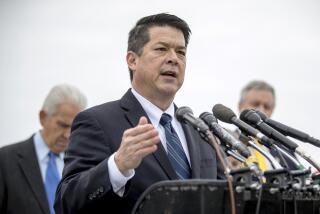Rostenkowski Rejects Deal, Vows to Fight
WASHINGTON — House Ways and Means Committee Chairman Dan Rostenkowski (D-Ill.) said Monday that he has chosen to fight charges of fraud and abuse of his public office rather than make a deal with federal prosecutors to plead guilty to lesser offenses.
“I have always fought for what I believe in. I strongly believe that I am not guilty of these charges and will fight to regain my reputation in court,” Rostenkowski said in a statement issued Monday night.
His remarks came on the eve of today’s deadline by the government to accept or reject its plea-bargain arrangement. “That is a far more attractive option than pleading guilty to crimes that I did not commit,” Rostenkowski said.
The decision appears to make it certain that he will be indicted on a series of felony charges--possibly as early as today, sources familiar with the case said. A Justice Department spokesman declined to comment on Rostenkowski’s announcement.
The Chicago lawmaker’s lawyers had urged him to consider the deal being offered by U.S. Atty. Eric Holder, a Clinton Administration appointee. Although it was understood to have meant a one-year prison term and his resignation from Congress, the bargain would have spared Rostenkowski and his family a public trial and possibly a longer prison term.
Under House Democratic Caucus rules, an indictment on felony charges punishable by a prison term of more than two years would mean that Rostenkowski would have to relinquish his chairmanship, until and unless he were acquitted.
The implications of his removal go far beyond the effects on the 35-year congressional career of a single lawmaker. Rostenkowski, whose legislative deal-making skills are considered unparalleled in Congress, is one of President Clinton’s most crucial allies in the Administration’s uphill efforts to pass comprehensive health care legislation this year.
Rostenkowski, 66, was considered so vital to the passage of the health bill that Clinton went to Chicago to campaign for him earlier this year, when he faced a strong challenge in the primary.
The Ways and Means Committee has already begun deliberations on the health bill, and it now appears it will lose its chairman just as it is to start voting after Congress’ weeklong Memorial Day recess. Ways and Means is one of five committees in Congress that have jurisdiction over the bill.
In the last few days, as negotiations between Rostenkowski and federal prosecutors reached a critical phase, a pall had settled over the House. While few House members had been willing to discuss it on the record, the situation had seemed to overshadow all the House’s official business and was the topic of many whispered conversations in the corridors and cloakrooms of the Capitol.
Although the chairman had agonized over the choice before him, the idea of pleading guilty had gone against all his instincts, friends said. “He finally came to closure late this afternoon,” spokesman Jim Jaffe said Monday.
Rostenkowski is represented by Robert S. Bennett, a leading Washington attorney well-known for his defense of public officials and others accused of white-collar crimes. It is expected that Bennett, who also is representing Clinton against a sexual harassment suit filed by Paula Corbin Jones, could delay any trial until after the November elections.
The federal investigation of Rostenkowski has been under way for more than two years.
Among the charges that probably would be included in an indictment:
* That between 1985 and 1991, he illegally converted stamps from the House post office to cash for his personal use. A key witness against him is likely to be former House Postmaster Robert V. Rota, who pleaded guilty to misdemeanor embezzlement charges last July.
* That he improperly used office funds to buy lavish gifts for friends from the House Stationery Store. On the advice of lawyers, Rostenkowski earlier reimbursed Congress for about $82,000 of purchases, without admitting wrongdoing.
* That he converted government-leased cars to his personal ownership.
* That he used government funds to pay “ghost employees”--people who were on his payroll but did no work.
All told, the charges could be such that the chairman would face a lengthy prison term, if convicted.
In his statement, Rostenkowski said he could convince the “ordinary citizens” of the jury that he was not guilty, just as he had done the voters of his district. But he conceded: “This will be a difficult fight.”
“The government has vast resources at its disposal, but truth is on my side,” he said. “I am confident that I will be vindicated, and I look forward to the return of the gavel.”
Times staff writer Ronald J. Ostrow contributed to this story.
More to Read
Get the L.A. Times Politics newsletter
Deeply reported insights into legislation, politics and policy from Sacramento, Washington and beyond. In your inbox three times per week.
You may occasionally receive promotional content from the Los Angeles Times.










